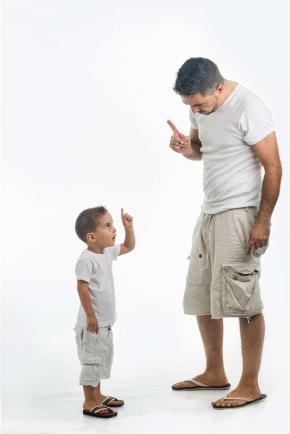
We live in a world where parents demand respect from their children. "Stop crying before I give you something to cry about,"� they may say. Parents will do everything in their power to make sure their children obey, yet fail to reciprocate respect to their children.
It isn't uncommon to hear parents talk about a child like he isn't there when the child is standing right next to them. How often have we heard the common phrase, "Because I said so."� Parents treat their children with little respect, yet demand nothing but respect in return.
Here are three ways to show our children respect:
Acknowledge your child's emotions
The first step in respecting our children is recognizing that emotions are OK to have. It's OK for a child to be shy in public. It's OK to not want to do activities other children are doing. Are we as parents happy all the time? Think of how you would feel if you were really upset about something. How would you feel if all your spouse did was tell you that you needed to stop being so worked up and everything would be OK? This is often how we respond to our children.
Whether they are tired, hungry or aren't getting what they want, there is always a reason children are acting the way they are. Parenting expert John Gottman says that this is our chance as parents to get down on their level and help talk them through their emotions. When we're upset, we just want to feel someone cares and understands. This is the same for children. Instead of telling a child he "better stop crying,"� try talking to him to see what the problem is.
Give your child time to fulfill responsibilities
Foster W. Cline, a parenting expert, says to never say, "Do it now,"� and never remind. He believes in giving children a timeframe in which your children can accomplish what you've asked of them. If your child fails to get it done, she should receive the natural consequences of her decision.
For example, how you do feel when your boss at work micromanages everything you are doing? We feel much more respected when our boss tells us what needs to get done, and allows us to do it in a reasonable timeframe. If we ask our child to take out the garbage sometime that night before going to bed and they never do, it would be a fair consequence to wake her up and remind her that the task has not yet been accomplished. Children should receive consequences related to the specific behavior that was unacceptable.
React with love and respect
"Unconditional Parenting," a book written by parenting expert Alfie Kohn says, "Children's sense of their competence, and perhaps of their worth, may come to rise or fall as a result of our reaction."� So much of children's desire to respect their parents and other adults comes from whether they feel respected in return. So much of how we act is based upon how we feel about ourselves. We must remember that children are people and need to be treated as such.
As parents, we must put ourselves in our children's shoes and think of how we would want people to respond if we were in their situation. Let them know the reasons for what you're asking of them, not demanding compliance because you said so. Don't let being in a public setting be an excuse to treat your child disrespectfully because you are worried about what people are thinking of you as a parent. If we want to gain respect from our children, let's start giving it.

